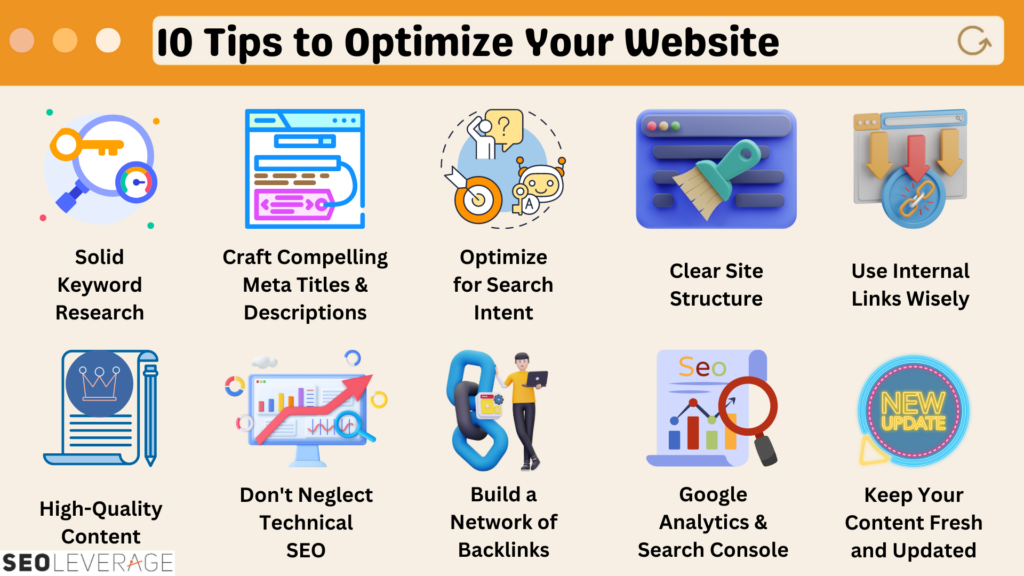Making your website easy for search engines to find is called SEO (Search Engine Optimization). It's like putting up big signs on the internet that lead people straight to your website.
It's about enhancing your website's visibility amidst the boundless sea of online information, particularly within search engine results. Whether you're penning a blog, running a small enterprise, or are part of a sprawling corporation, grasping the nuances of SEO for your website is pivotal.
Here's a closer look at what SEO means and why it's a critical component of your digital presence, followed by 10 actionable tips on how to do SEO for your website.
Table of Contents
What is SEO and why is it important?
SEO stands for Search Engine Optimization, a multifaceted strategy aimed at improving your website's visibility when people search for products, services, or information related to your business in Google, Bing, and other search engines. The goal is to enhance your site's rankings on search engine results pages (SERPs) and increase organic (non-paid) traffic.
Most online journeys begin with a search engine. If your website doesn't rank well for relevant keywords, you're likely missing out on significant traffic, potential leads, and sales opportunities.
SEO makes your website more visible, which means more traffic and more opportunities to convert prospects into customers. It's also a great way to make your brand known, connect with potential customers, and establish yourself as a reliable and knowledgeable leader in your industry.
How to Do SEO for a Website?
If you want to increase the visibility of your website and drive more organic traffic, then implementing SEO strategies is a must. By following these SEO best practices, you'll be on to success.
1. Start with Solid Keyword Research
Keyword research guides the direction of your SEO efforts. It involves using a keyword research tool to discover which terms and phrases your target audience types into search engines.
These target keywords should be the foundation of your content, from each blog post to every web page. By aligning your content with relevant keywords, you're more likely to appear in relevant search queries, making your site more visible to those who need it.
2. Craft Compelling Meta Titles and Descriptions
Think of the meta title and meta description as the front door to your website's pages. They're what users see first in search engine results pages (SERPs). A well-crafted meta title and description not only summarize the content of your page but also entice users to click through. They're your first opportunity to make an impression, so make sure they're inviting and reflective of the content within.
In addition to containing relevant information, it must contain a certain number of characters. To be the first impression that the reader of our readers has, we must keep the maximum details, because the users have to click on the meta-descripción. We must write down the relevant information and that there is a relationship with the reader.
3. Optimize for Search Intent
Search intent is all about understanding why someone is searching. Are they looking to buy, to learn, or simply to find a specific website? Tailoring your content to meet this intent is key.
For instance, if someone is looking for "how to bake a cake," they're likely expecting a detailed blog post or guide, not a product page for cake mix. Aligning your content with the user's intent improves the chances of your pages ranking well in search results.
4. Ensure Your Site Structure is Clear
A well-organized site structure helps your visitors navigate your website easily and aids search engines in understanding the hierarchy and importance of your pages. This clarity can lead to better indexing and, ultimately, better visibility in search engine results.
Think of your website as a library where every book (web page) is easy to find because of a logical organization system.
In addition, the clearer our structure is, the easier it will be for Google and we will obtain positioning on top of search engine results pages (SERPs).
5. Use Internal Links Wisely
Internal links are the pathways that connect one page on your site to other pages. They guide visitors and search engine bots through your content, showing how pages are related and which are most important.
A blog post about cake-baking tips, for example, might include internal links to related recipes or baking tool recommendations. This not only enhances user experience but also strengthens the SEO of your site by spreading link equity around.
6. Embrace High-Quality Content
The heart of any successful SEO strategy is high-quality content. This means creating blog posts, articles, and web pages that provide real value to your audience. Whether it's solving a problem, answering a question, or offering insights, your content should be engaging and informative.
Remember, search engines like Google aim to serve the most relevant content to users, so make sure yours stands out.
7. Don't Neglect Technical SEO
Technical SEO might sound daunting, but it's essentially about making sure your site is compatible with search engine guidelines. This includes optimizing your site for mobile devices, ensuring fast load times, and securing your site with HTTPS. Tools like Google Search Console will help you monitor and maintain your site's technical health, ensuring it's always ready for both users and search engine bots.
8. Build a Network of Backlinks
Link building involves encouraging other trusted websites to create links that lead back to your site. These backlinks act as votes of confidence in the eyes of search engines, boosting your site's authority and position in search engine results. Whether through guest blogging, partnerships, or creating shareable content, a strong backlink profile is a key component of any robust SEO strategy.
9. Utilize Google Analytics and Search Console
Tools like Google Analytics and Google Search Console are invaluable for anyone looking to optimize their site for search engines. They provide insights into how users find and interact with your site, highlight issues that might be affecting your performance in search results, and offer suggestions for improvement. Regularly reviewing this data allows you to refine your SEO strategy and make informed decisions.
10. Keep Your Content Fresh and Updated
The digital world is always evolving, and so should your website. Updating old content, adding new pages, and regularly publishing blog posts keep your site dynamic and relevant. This provides ongoing value to your audience and also signal to search engines that your website is active and up-to-date, which can positively impact your rankings.

Final Thoughts
Incorporating these tips into your SEO plan can enhance your website's visibility in search engine results, driving more organic traffic and ultimately contributing to your site's success. Remember, SEO ahouldn’t be a one-time task but an ongoing process of improvement and adaptation to the ever-changing landscape of the internet and search engine algorithms.
Get Expert SEO Help with SEOLeverage
Want your website to be noticed? SEOLeverage can help! Our team knows just what to do to make your website popular on search engines like Google. We're here to get you to the top and make sure the right people find you.
At SEOLeverage, we look at what makes your website special and create a plan just for you. We help you pick the best words to use, make your site fast and easy to use, and much more. We always keep up with the latest changes in SEO to make sure your site stays on top.
Want to make your website stand out? Contact SEOLeverage today, and let's get started!

